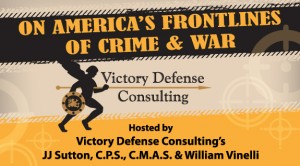Radio Interviews: On America’s Frontlines of Crime & War” found on Voice America which broadcast to over 130+ countries.
http://www.voiceamerica.com/episode/52266/untrained-bodyguards-vs-professional-protection
Industry experts are invited to share their experiences and training tips for new Executive Protection agents. The industry has evolved and veteran agents are faced with major transitions since they initially started.
Executive Director Jerry Heying emphasizes the importance of advance work as the most important skill to be developed for a successful and distinct career; they also highlight that professionalism is what makes or breaks a good Executive Protection agent.
Agents must work hard to avoid the problem and anticipate difficulties prior to those issues arise. The vast spectrum of backgrounds and experiences as to where our agents come from has a great effect to how an agent will handle each situation and client.
Military experience is a valuable asset to have but a successful bodyguard seeks training from reputable schools that will teach not only theoretical and practical skills, but they will also provide resources to their students but teaching them networking techniques to ensure that they get hired.
To listen to the show click: HERE


Sorry to be critical but we are talking about professionalism here. Ray, I hope you are better educated than your comment suggests, spelling and grammar.
Traning is to me the guide lines for all E.P.WORK SO LETS DO ARE JOB. AND GIVE ARE CLIENTS THEIR MONEY WORTH.
The issue of formal training and mandatory standards is a big one. On one hand, the majority of people I see don’t belong in the industry and some are beyond redemption (training can’t correct attitude or ethics), and on the other, I’m not sure whether a lot of the clientele would bear the inevitable increased costs. Budgets are tight and even high-net-worth individuals seem to shop for the lowest bidder. As for corporations and VVIPs, they already screen and require proper creds, training & background so regulation wouldn’t help them.
I otherwise feel vindicated by Jerry Heying’s (and JJ Sutton’s) statements about looking beyond the strictly protective role to add value to the service. Many people seem to endorse the “back against the wall” approach that only works on high risk assignments. Domestically, I think it’s about laziness and sort-sightedness. Because “facilitating” the client’s movements also contributes to safety in the larger sense – it’s not just a matter of job security.